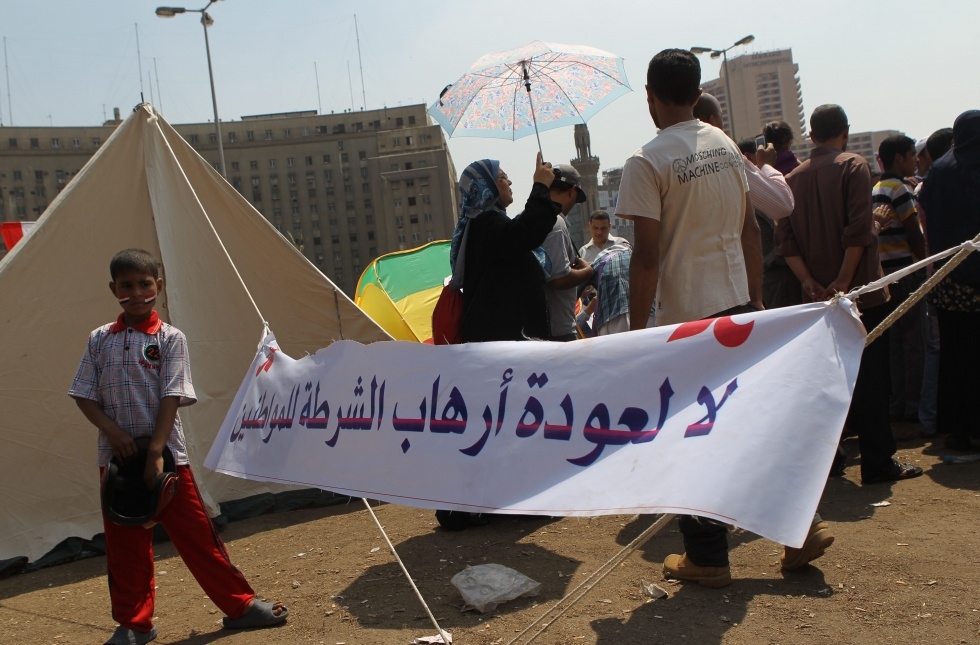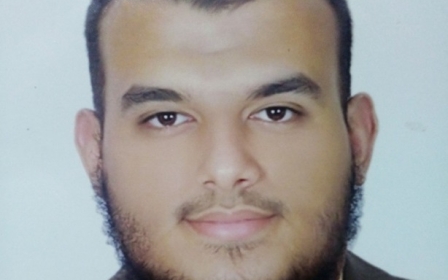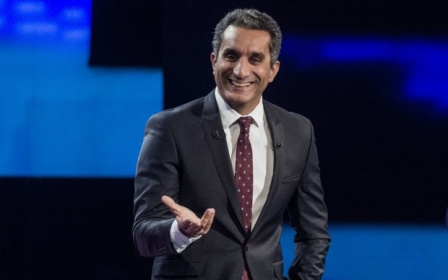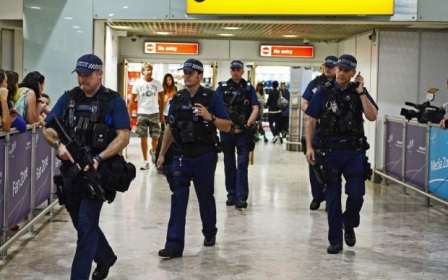When police rape, who can people turn to?

In the late hours of a Cairo evening two weeks ago, a woman was sitting in a car with a man by the side of the road. Two passing police officers stopped and ordered the two out of the car then insisted they would drive the woman home. Instead, they raped her.
Known cases of sexual violence crimes by state and non-state actors have been on the rise in Egypt over the past four years. At the same time, police officers have not been held accountable for the crimes they have committed, a point that is particularly significant in an uprising that was largely motivated by impunity for crimes committed by a brutal police force.
So who do people turn to, if they can’t rely on the police to protect them?
Earlier this year, in June, newly elected President Abdel Fattah al-Sisi ordered the interior ministry, responsible for Egypt’s police force, to take all necessary measures to combat the “sexual harassment” of women after a series of attacks - which would have been more appropriately described as sexual assaults - took place around his swearing-in in Cairo’s Tahrir Square.
At least nine women, who were there to celebrate Sisi’s victory, were sexually assaulted and violently beaten by mobs of men between 3 and 6 June. The attacks drew widespread criticism from human rights groups for the state’s failure to curb a growing problem.
One 42-year-old woman in Tahrir Square with her daughter was stripped naked and violently attacked, leaving her backside bloodied and bruised. The attack was recorded and the video, uploaded onto YouTube, sent shockwaves through society. She also sustained injuries to her genitalia and hot water burns on 40 percent of her body.
This was just the latest in a series of documented incidents of mob and other sexual assaults in Tahrir Square. More than 90 attacks were reported in the week of 30 June, 2013, alone, when thousands of protesters were in the public square calling for then president Mohamed Morsi to resign.
On 25 January 2013, at least 25 women were sexually assaulted by mobs in the square. One woman was raped with a knife. And there are numerous other, similar incidents that have been documented in 2012, 2011 and further back.
So what does the recent incident of police officers raping a woman have to do with the mob sexual assaults in Tahrir? Two things: state impunity and denial. Let’s start with the latter.
Mervat Tallawy, head of the National Council for Women, a state body formed to propose women-empowering policies, denied that rape or any form of violence against women took place in Egypt’s prisons, saying that these were rumours made to ruin Egypt’s image abroad and to make the 30 June “revolution” that ousted Morsi a failure.
“It’s not possible for a para-military organisation to do such things inside prison,” Tallawy said.
Documentation by human rights groups and journalists contradicts this. The El-Nadeem Center for the Rehabilitation of Victims of Violence, a Cairo-based non-governmental organisation, has long been documenting incidents of rape inside and out of Egypt’s prisons, particularly those committed by state actors, that go back to at least the 1990s.
In 2012, El Nadeem documented the case of a 30-year-old housewife who was raped inside Matareya police station. Between 2012 and 2013, they continued to document incidents of rape and threats of rape committed against detained men and women by uniformed police officers and their plain-clothed aides.
On 1 July, Amnesty International published a report saying that there had been a surge in arbitrary arrests and torture in the past year. It included testimonies from male detainees who allege that they were raped in police detention.
Earlier this year, two male political dissidents claimed they were raped by plain-clothed officers inside police stations, according to the Guardian newspaper. Threats of rape have also been documented inside Egypt’s military jails.
A report produced by the International Coalition for Egyptians Abroad, a group affiliated with Morsi’s supporters, estimates there have been 1,585 female detainees between 3 July, 2013, and June 2014 and highlights allegations of rape and threats of rape.
In September, a policeman was referred to criminal trial on charges of raping a mentally ill woman at a Cairo police station. The interior ministry issued a statement at the time saying it “does not cover-up any incident attributed to policemen. It takes the necessary actions to investigate them strictly ... and that deterrent measures are taken against all those involved in its commission.”
It was a welcome admission by the interior ministry, and yet we still have Tallawy’s contradictory statement. Denying that a problem exists, and blaming rape allegations on a political battle over narratives, undermines people’s testimonies and serves only to offer further impunity for the perpetrators of such crimes.
And there have been numerous testimonies of women being raped by police officers outside of prison.
In a harrowing account, a female political activist recounted to British-Egyptian journalist Sarah Carr how in December last year, after being regularly followed and harassed by state security agents and plain-clothed officers, she was raped in a non-residential neighbourhood in central Cairo.
Al-Azhar university student Nada Ashraf recalled to a news website that in the same month, after trying to help a female student who was being harassed by a police officer, she was caught instead, and he took her to his police vehicle and raped her.
In early 2011, a 35-year-old British female humanitarian worker was raped by an Egyptian army officer at a security checkpoint in North Sinai. This summer, a British businesswoman in her 40s claimed she was raped by a security guard in a five-star hotel in the Red Sea resort of Sharm El-Sheikh.
Also this summer, a German tourist alleged that an Egyptian police officer had raped her and her mother in the Red Sea resort of Hurghada. The officer was arrested but released when the tourist dropped her complaint, according to the state-run Ahram Online news site.
Those are the stories we hear about. There are likely many more in a country where human rights groups say sexual violence crimes are under-reported due to social conservatism about the issue and fears of further harassment by the police.
According to a 2013 study partly funded by UN women, 93.4 percent of women who were subjected to sexual harassment in the streets did not report the crime to the police. Among the six reasons given for not doing so were fears about their reputation, a lack of knowledge about their rights, and fears of further harassment by policemen.
If the police are perpetrators of sexual violence crimes, the state has little moral authority to uphold the law and punish crimes of sexual violence that take place by ordinary citizens. These crimes will also continue being under-reported.
The police-as-perpetrators is also nothing new. In 2005, in an incident known as Black Wednesday, women protesters and journalists were sexually assaulted by mobs of pro-regime men as the police stood by and watched. The following year, women were chased and sexually harassed by mobs of youth in downtown Cairo, again, as policemen reportedly stood-by and did nothing.
Yet the law comes down with a heavy hand when it comes to non-state actors. Ten defendants, who are accused of kidnapping and raping a woman from the governorate of Kafr el-Sheikh in 2006, are being considered for the death penalty, the maximum penalty for rape in Egypt.
The defendants in the case for the June 2014 mob sexual assaults received between 20 years to life in prison for their crimes.
And yet when it comes to allegations of police officers raping and sexually assaulting women we hear of little follow-through with regards to their punishment.
If Egypt is to deal with its problem of sexual violence, and President Sisi is serious about his commitment to eradicating such crimes as sexual harassment, the first example he needs to make is of the police. For them, there should be a zero-tolerance policy for crimes of sexual violence in order for ordinary people, women and men, to feel safe in their midst.
- Nadine Marroushi is a British-Palestinian journalist who has worked for Bloomberg and the English edition of Al-Masry Al-Youm (also known as Egypt Independent), and as a freelance journalist has written for The National newspaper in the UAE, and the London Review of Books blog. She has also been published by the Financial Times, and other international publications.
The views expressed in this article belong to the author and do not necessarily reflect the editorial policy of Middle East Eye.
Photo: Pro-democracy activists demonstrate behind a banner which reads : "No for the return of police brutality against civilians" on 1 July, 2011 in Cairo's Tahrir Square (AFP)
New MEE newsletter: Jerusalem Dispatch
Sign up to get the latest insights and analysis on Israel-Palestine, alongside Turkey Unpacked and other MEE newsletters
Middle East Eye delivers independent and unrivalled coverage and analysis of the Middle East, North Africa and beyond. To learn more about republishing this content and the associated fees, please fill out this form. More about MEE can be found here.





